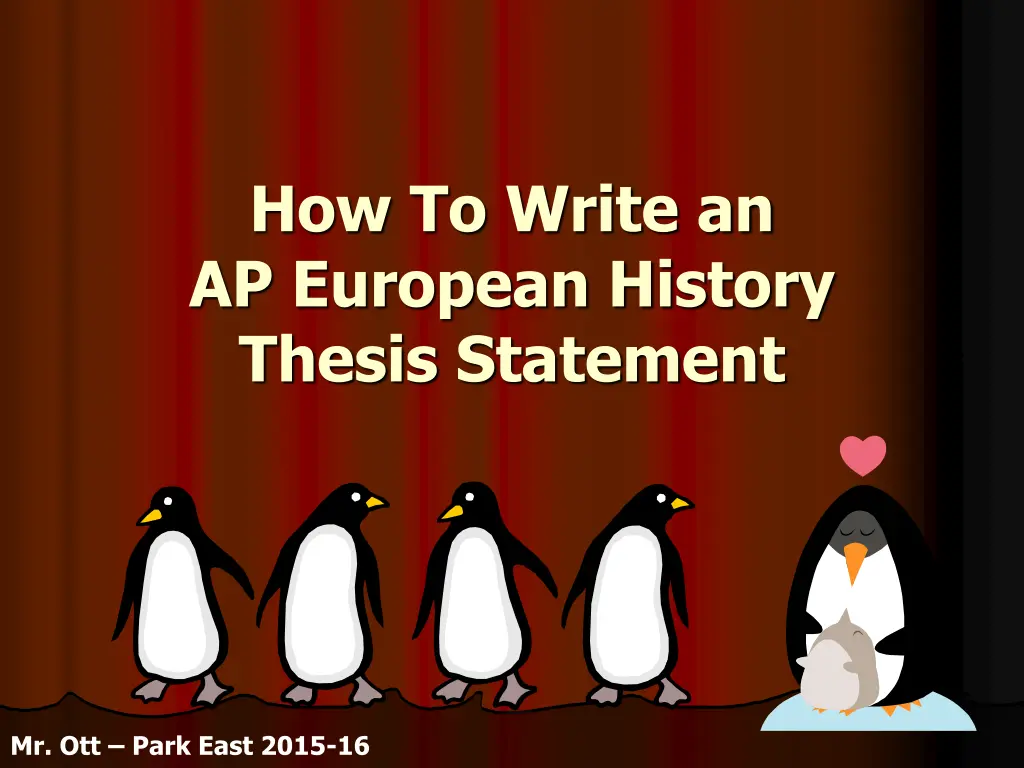
Crafting Effective AP European History Thesis Statements
Learn how to write a strong thesis statement for your AP European History essays, understand the importance of interpreting prompts correctly, and master the art of formulating nuanced arguments within a thesis continuum. Improve your essay scores by following expert tips and strategies.
Download Presentation

Please find below an Image/Link to download the presentation.
The content on the website is provided AS IS for your information and personal use only. It may not be sold, licensed, or shared on other websites without obtaining consent from the author. If you encounter any issues during the download, it is possible that the publisher has removed the file from their server.
You are allowed to download the files provided on this website for personal or commercial use, subject to the condition that they are used lawfully. All files are the property of their respective owners.
The content on the website is provided AS IS for your information and personal use only. It may not be sold, licensed, or shared on other websites without obtaining consent from the author.
E N D
Presentation Transcript
How To Write an AP European History Thesis Statement Mr. Ott Park East 2015-16
What is a thesis? A thesis statement is the position a student is going to take, the argument that is going to be made. It is therefore the answer to the question being asked.
What is not a thesis? The thesis statement is not a fact; it is an informed interpretation of the facts. Neither is the thesis/argument just an opinion. Instead, the thesis is the reasoned judgment of the student.
Dont understand the prompt? Thesis will not be good = essay flops Don t feel like answering the prompt? JUST DO IT! Answering the prompt will ensure a fair score Answering the prompt with good/great theses/arguments ensures a much higher score
The Importance of Understanding the Prompt Many students want to read the question quickly and move on to writing. However, AP Euro essay prompts are challenging. They ask students to perform specific writing tasks. The questions also contain qualifiers that guide and restrict your answer. Rather than taking 10 seconds to read the question, you would be better off spending 45 seconds reading, re-reading, marking, and analyzing. Remember, a mistake in understanding a question could make the rest of a student s effort almost worthless.
Break it down like so: Circle the task at hand (analyze, assess, compare, etc.) Underline the historical subject/content Box out the time period given, or assign one Next, brainstorm (in whatever organic way makes sense to you) the information needed to answer the prompt in full. Write a thesis statement that demonstrates an argument and the topics to come. Double check that your thesis answers all parts of the prompt as you diagrammed it before you begin writing.
Thesis Continuum Most good questions allow for a range of possible answers. A continuum exists and students can generally feel free to choose a response along that continuum. Students should avoid crafting an extreme response at either end of the continuum. Most questions require a response that is not black or white but instead some shade of gray. That does not mean, however, that students should attempt to respond in the exact middle of the continuum. Such an attempt usually results in a failure to articulate a clear position.
Thesis Continuum I don t know what s going on I m I m extremely pro! extremely con!
A good thesis is narrow but not too narrow A well-written thesis statement must be narrow enough to limit the writer to something that can be addressed in about thirty minutes but not so narrow as to prevent them from writing relevant things that help answer the question or that ignore big evidence. A thesis that is too broad will cause the student to briefly mention a wide variety of information that may seem unrelated to the reader.
Positive Response Bias Students should also beware of the fallacy of positive response POV. Many students are inclined to answer a question in the affirmative. Students always need to carefully weigh all of the historical evidence and then craft a response that best articulates their understanding of the historical record.
A good thesis shows analysis A strong thesis will go beyond a Miss America answering of the question. Contestants in that pageant will often merely restate the question in the form of a statement and add a couple of words. This rewording of the question is overly simplistic and does not allow the writer to show analysis. Readers of the AP Euro exam want to see a well- developed thesis that goes beyond simply stating facts or basic opinions about the question. The thesis should help the reader understand why the position is held. http://www.youtube.com/watch?v=WALIARHHLII&feature=related
